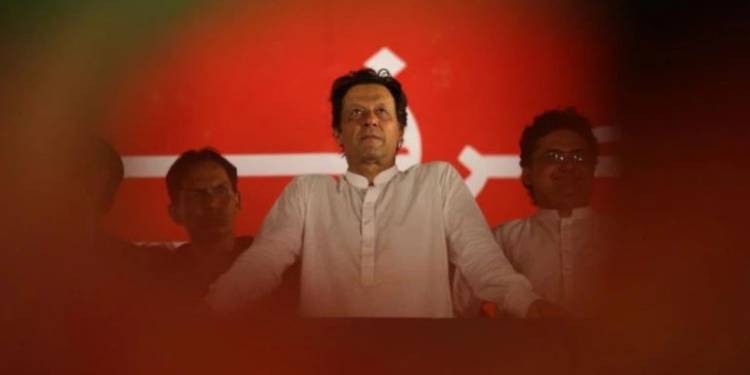Even as Pakistan PM Imran Khan continues his senseless tirade, he seems to have succeeded in diverting global attention from the ongoing domestic crisis in Pakistan. An ongoing strife, serious political discontment against the Imran Khan government and an internal strife shows that Pakistan might be stating towards an imminent danger of a civil war, which could ultimately lead to balkanisation of Pakistan.
By constantly harping on the Kashmir issue, Imran Khan tried to evade domestic criticism and attention from issues exposing Pakistan’s dire state. However, failure to reap dividends on the Kashmir front have only made the matters worse. With its economy sailing in troubled waters on account of sluggish GDP growth, mounting debt crisis, devaluation in currency and soaring inflation, the country is already facing a hard time. What has made matters worse is failure on almost all policy fronts.
China which once looked like an all weather ally to the terrorist country has gradually started appearing like an imperialist power as Pakistan seems to be on its way of becoming a Chinese colony. The manner in which it came to light that spouses of several Pakistani men, mostly traders or businessmen, who had married women from the Uighur Muslim community in China had disappeared only made matters worse. Pakistan started looking further debilitated when Pakistan PM Imran Khan called China Pakistan’s best friend on being asked about persecution of Uighur Muslims in Xinjiang. With this Pakistan exposed its desperate and fragile position.
Pakistan is also facing a massive internal strife that came to surface recently with Baloch American, Sindhi American and Pashto American communities descending to the NRG Stadium during the “Howdy Modi” event in Houston from different parts of the US to draw the attention of PM Modi and US President Trump about the blatant human rights abuses done by Pakistan on their communities in their native regions. From religious to ethnic, minorities in Pakistan have been a victim of the oppressive policies of the largely Punjabi dominated Pakistani administration, which has not only exploited these minorities but have also stripped them of their basic human rights. The nationwide crackdown by Pak government on Pashtuns since the last year has once again exposed how Pakistan has been crushing internal voices. However, Pakistan is no longer able to hide the growing dissatisfaction among several sections of its populations, particularly the ethnic minorities.
Earlier, Pakistan military had emerged as the instrument which was capable of inflicting extreme brutalities virtually killing all dissenting and democratic voices within the country. When Imran Khan regime came to power, the Pakistan PM was seen as an agent of the Pakistan military. The Imran Khan government seemed to enjoy a cordial equation with the military leaders, Pakistan’s de facto rulers. However, with his statement admitting that ISI and Pakistan Army had trained the Al Qaeda, Imran Khan seems to have lost the favour of Pakistani military establishment also. This is most probably going to push Pakistan into political instability in the near future which will have a lasting impact on the stability of the country, which already seems to be in disarray.
The upcoming FATF meeting is also expected to bring some really bad news for Pakistan with the country’s political leadership shamelessly accepting that it has been fomenting terrorism in the region by sponsoring terror outfits on its own soil. Pakistan is facing disappointment on all fronts. Its social fabric has become fragile following decades of persecution of religious minorities and state sponsored exploitation of ethnic minorities. Even as terrorist country’s political leadership continues to target India over the recent move on Kashmir, Pakistan is starting into a very likely prospect of a major civil war.




























